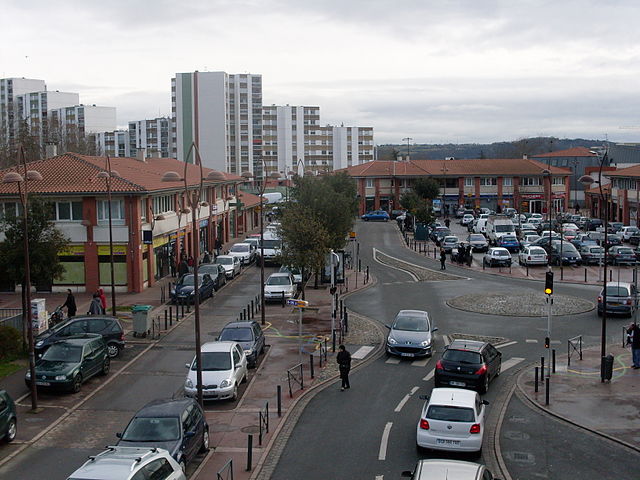I looked down the list
Atlas des Zones urbaines sensibles (Zus)
A lot of those places you could walk around if you wanted to. Fire crews would probably need to be accompanied by the police in some of them if they were to attend a fire. In a number, such as the quartiers nord of Marseille only reinforced police units would be safe entering but they are not total no go areas.
Here is a TV documentary (in French) about policing in the quartiers nord.
So you can see there is an active but ad-hoc police presence.
In this article, "A Marseille, en patrouille avec les renforts de Manuel Valls", you can read that the French state wants to "reestablish French republic order" in the quartiers nord; implying that there is an issue with the writ of the French state in some sectors. And l'Express talks of police free zones with the new right wing Mayor of the 7th district saying that Marseille city hall refuses foot patrols in the senstive areas.
-- edited May 2015
I found this passage written by a civil servant6 recounting his time working for Nicolas Sarkozy. The quote is from Au Coeur du Volcan if you want to go and read it.5 Here a public servant clearly states that parts of Seine St Denis are a No Go Zone for the authorities. Now that's not the 751 Zep mentioned by the Americans but one can imagine that there are other Seine St Denis in France. Given the date it should be possible to identify the prefect, it could be Claude Baland or Nacer Meddah or more likely Christian Lambert.
It was the bi-weekly meeting of the security chiefs. Sarkozy paced the room, frowning, you could feel the storm approaching. "Where are we with drug dealers in St Denis", he asked the prefect. "We need to take back control of the apartment blocks, one by one, make it impossible for the dealers to operate. A guy driving round in a new BMW 7 series, well the tax authorities should be asking where the money is coming from. I'm controlled all the time by the IRS, they say its for my protection." "Yeah, you must be one of the most protected people in the country", chuckled the interior minister.
The prefect hemmed and hawed "it's not easy, the place is full of illegals, squats, slums and shanty towns everywhere, its the third world, it is almost impossible to operate down there, it is a no go zone for the authorities, totally chaotic. When we do arrest an illegal the courts release them". Another minister interjected "it is impossible to send anyone back, we know where they come from but we can't get visas from their embassies, they don't want them, without a visa we can't put them on a plane."
-- Note (see Chris' comment below). This comment makes no claims about religious affiliations, it is just a claim made about no go zones on France to illustrate that even the French authorities make such claims at times.
-- edited November 2016
The term "no go zone" or "une zone de non-droit"7 is being used more frequently in France now following the Bataclan and Nice attacks and in particular after the attack at the Crossroads of Viry-Châtillon in the suburbs of Paris. The Viry-Châtillon attack has left a policeman in a very serious condition after a patrol had their cars firebombed. The point of contention is a crossroads that is under the control of gangs who charge motorists a "toll" to pass through. Apparently the gangs have controlled the crossroads for 3 years without the police being able to reestablish order. It is effectively a no-go zone for normal policing and people. The attack has led to demonstrations by the police throughout France, they claim that the justice system doesn't take gang crime seriously. Even French President Hollande has joined the debate accusing judges of "cowardice" and "hiding" by "playing the virtuous"; although he later backed down8.
-- edited November 2018 --
The French government, having long denied there was a problem of no-go zones in France has now made la Reconquête Républicaine official government policy9. In his resignation speech former interior minister Gerard Collomb warned that in certain areas of France
"the situation is very bad, yes, today, it is really the law of the jungle, traffikers and radical islamists have replaced the French republic"11
More seriously he foresees France slipping into civil war, this is what he told a journalist recently:
The situation in France "is very worrying, what I read each morning in notes from the police reflects a very pessimistic situation. The relationship between people is very tough, no one wants to live together."
Journalist "the new law on immigration only tackles illegal immigration, there are more than 200,000 legal migrants a year coming to France"
"Yes it is true, we are going step by step but that is a problem, we don't need any more immigration in France. The communities are confronting each other more and more and it is getting very violent, there is a risk of partition, I don't want to worry people but there is little time left, it is hard to say but within five years we'll be beyond the point of no return, afterwards...."10

